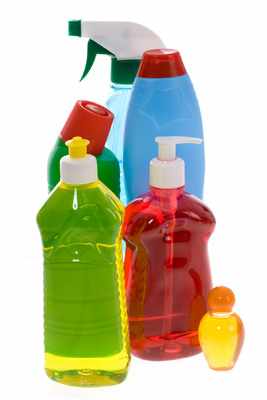- MENU
- HOME
- SEARCH
- WORLD
- MAIN
- AFRICA
- ASIA
- BALKANS
- EUROPE
- LATIN AMERICA
- MIDDLE EAST
- United Kingdom
- United States
- Argentina
- Australia
- Austria
- Benelux
- Brazil
- Canada
- China
- France
- Germany
- Greece
- Hungary
- India
- Indonesia
- Ireland
- Israel
- Italy
- Japan
- Korea
- Mexico
- New Zealand
- Pakistan
- Philippines
- Poland
- Russia
- South Africa
- Spain
- Taiwan
- Turkey
- USA
- BUSINESS
- WEALTH
- STOCKS
- TECH
- HEALTH
- LIFESTYLE
- ENTERTAINMENT
- SPORTS
- RSS
- iHaveNet.com: Health
Andrea Donsky and Randy Boyer

Many of the chemicals in cleaning products contain volatile organic compounds, which can have health effects ranging from eye irritation to cancer
From bleach to grease-busters to deodorizers, there are plenty of chemical cleaners out there to tackle your dirtiest, grimiest, bacteria-laden situations. But there's a problem: Many of those cleaning products contribute to indoor air pollution.
It's common knowledge that many chemicals are poisonous or can harm your skin, but many chemical cleaning products also release harmful gases into the air in your home--and some of the worst chemicals, such as nitrobenzene, formaldehyde, and naphthalene, are potential or known carcinogens.
Indoor air pollution is a serious concern, particularly in the winter months, when closed windows and doors means ventilation is reduced. According to the
Many of the chemicals in cleaning products contain volatile organic compounds (VOCs), a group of chemicals that release, or off-gas, organic compounds into the air in your home. According to the
Room deodorizers may seem like a good way to zap those chemical smells, but in a review published in the
Scent is also an issue that can't be ignored. The scent of chemicals in many cleaning products is masked with more pleasing synthetic scents. But the results of two randomly sampled surveys of a total of 2,115 Americans, published in the
While commercial cleaning products present a bevy of environmental health hazards, there are plenty of natural cleaning solutions that will keep you and your family healthy and squeaky-clean. It might take a little more elbow grease, but consider it exercise--also good for your health.
NATURAL CLEANING SOLUTIONS
Lemons:
Lemons are a fantastic cleaner. The acid in lemons cuts through grease and the scent is fresh and pleasing for most people. Just keep in mind that lemon oil contains limonene, which can mildly irritate the eyes, nose, throat, and skin--so it may not be the best option for people with severe asthma or respiratory health issues.
Vinegar:
White vinegar is a fantastic de-greaser, and it's a good alternative to lemon. It can be used to clean everything from your toilets, counters, and floors, to your coffee maker and windows.
Baking Soda:
Baking soda is a fantastic abrasive for cleaning hard surfaces. Just don't use it on anything that will scratch easily. Mix equal parts baking soda and water to form a paste
Vinegar and Baking Soda:
Do you remember when you made that volcano when you were in grade school? Well, that volatile reaction you got when mixing vinegar and baking soda is the answer to your clogged drain. Mix equal parts together, pour down the drain, and let it do its magic for at least one minute before rinsing with water.
Olive Oil:
This rich oil is a fantastic alternative to furniture polish or wax. Use a lower grade oil, rather than extra virgin olive oil to save a few pennies.
Tea Tree Oil:
The natural antibacterial properties of tea tree oil make it a wonderful disinfectant, and it is also an anti-fungal agent, so it's good for clearing up mold or mildew in the bathroom. Mix 10 drops of tea tree oil in two cups water to dilute.
Borax (Sodium Borate):
This mineral is used in many commercial detergents, among many other products. It has strong anti-fungal properties, and it's a natural ant-, cockroach-, and flea-killer. Mix with water in a spray bottle for easy cleaning in the kitchen and bathroom.
© Andrea Donsky and Randy Boyer, Naturally Savvy
AGING | ALTERNATIVE | AILMENTS | DRUGS | FITNESS | GENETICS | CHILDREN'S | MEN'S | WOMEN'S
Health - Cleaning Naturally Improves Indoor Air Quality